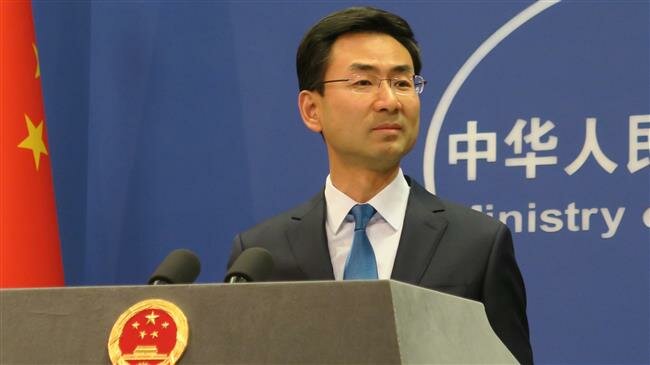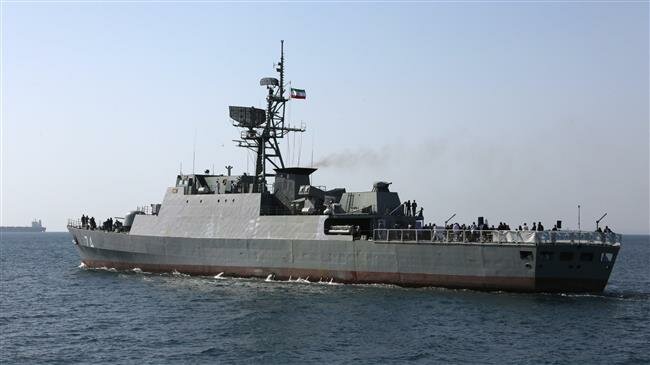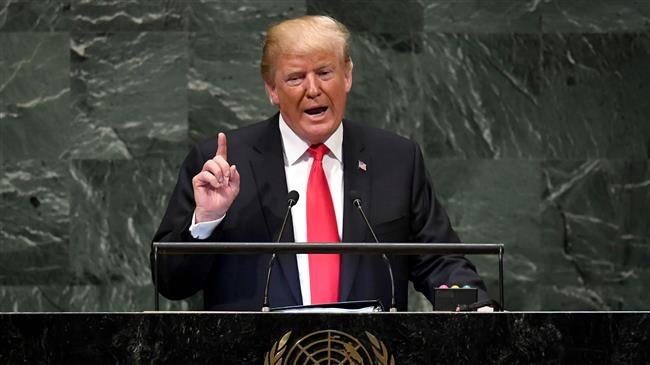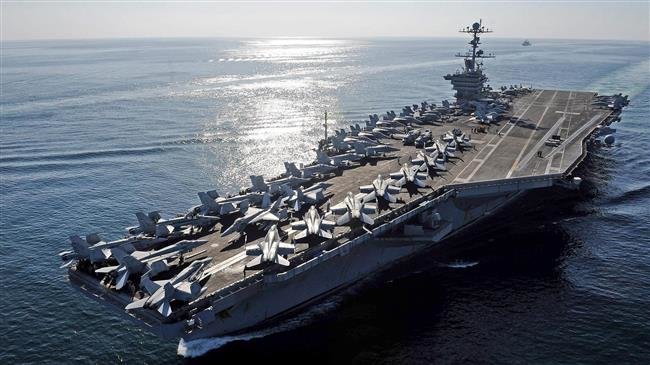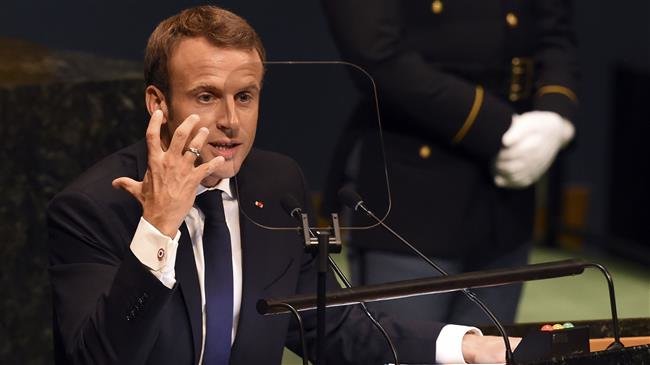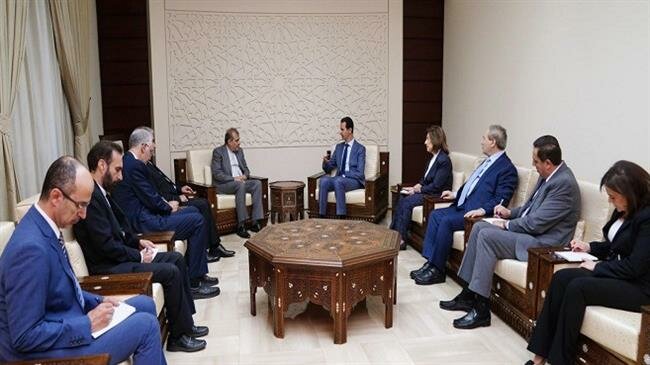"China firmly opposes the unilateral sanctions and so-called 'long-arm jurisdiction' that the US imposes on Iran, and regrets that such practices have escalated tensions on the Iranian nuclear issue," China's Foreign Ministry spokesperson Geng Shuang said at a regular press conference on Monday.
Publish dateMonday 6 May 2019 - 23:42
Story Code : 184632
AVA- He emphasized that the multilateral nuclear agreement, officially known as the Joint Comprehensive Plan of Action (JCPOA), has been endorsed by the UN Security Council and should be implemented "in full and effectively."
The nuclear deal plays a vital role in promoting the international non-proliferation regime and peace and stability in the Middle East, he added.
The Chinese spokesperson said “normal cooperation between various parties and Iran under the framework of international law is completely legitimate, reasonable and lawful and must be respected and protected.”
The administration of US President Donald Trump on Friday imposed sanctions on Iran's export of enriched uranium, but at the same time renewed three key waivers that will allow its European allies, Russia and China to cooperate with the Islamic Republic on civil nuclear program.
"Any involvement in transferring enriched uranium out of Iran in exchange for natural uranium will now be exposed to sanctions. The United States has been clear that Iran must stop all proliferation-sensitive activities, including uranium enrichment, and we will not accept actions that support the continuation of such enrichment," the State Department announced in a statement.
The US administration also said in a statement on April 22 that, in a bid to reduce Iran's oil exports to zero, buyers of Iranian oil must stop purchases by May 1 or face sanctions. The move ended six months of waivers, which allowed Iran’s eight biggest buyers -- Turkey, China, Greece, India, Italy, Japan, South Korea and Taiwan -- to continue importing limited volumes.
“The United States, Saudi Arabia and the United Arab Emirates ... along with our friends and allies, are committed to ensuring that global oil markets remain adequately supplied,” the White House statement said, adding, “We have agreed to take timely action to assure that global demand is met as all Iranian oil is removed from the market.”
Last November, the US enforced sanctions targeting the Islamic Republic’s banking and energy sector. However, it granted waivers to the eight major importers of Iran’s oil, fearing market instability.
The Chinese Foreign Ministry spokesman further said the nuclear projects' arrangements under the JCPOA "reflect a balance of Iran's obligation on nuclear non-proliferation and its right to use nuclear energy for peaceful purposes, which serves the interests of all parties including the US."
Geng emphasized that China would continue to work with all parties to maintain and implement the historic nuclear accord, safeguard the international non-proliferation regime, peace and stability in the Middle East and protect the lawful and legitimate rights and interests of Chinese companies.
US President Trump withdrew Washington in May 2018 from the JCPOA, reached between Iran and the P5+1 group of countries -- the US, Britain, France, Russia and China plus Germany -- in July 2015. He also decided to re-impose unilateral sanctions against Tehran.
Under the JCPOA, Iran undertook to put limits on its nuclear program in exchange for the removal of nuclear-related sanctions.
Despite Washington's withdrawal, Iran has not left the deal yet, but stressed that the remaining signatories to the agreement have to work to offset the negative impacts of the US pullout for Iran if they wanted Tehran to remain in it. The other parties to the JCPOA have repeatedly announced that the deal is working and should stay in place.
The nuclear deal plays a vital role in promoting the international non-proliferation regime and peace and stability in the Middle East, he added.
The Chinese spokesperson said “normal cooperation between various parties and Iran under the framework of international law is completely legitimate, reasonable and lawful and must be respected and protected.”
The administration of US President Donald Trump on Friday imposed sanctions on Iran's export of enriched uranium, but at the same time renewed three key waivers that will allow its European allies, Russia and China to cooperate with the Islamic Republic on civil nuclear program.
"Any involvement in transferring enriched uranium out of Iran in exchange for natural uranium will now be exposed to sanctions. The United States has been clear that Iran must stop all proliferation-sensitive activities, including uranium enrichment, and we will not accept actions that support the continuation of such enrichment," the State Department announced in a statement.
The US administration also said in a statement on April 22 that, in a bid to reduce Iran's oil exports to zero, buyers of Iranian oil must stop purchases by May 1 or face sanctions. The move ended six months of waivers, which allowed Iran’s eight biggest buyers -- Turkey, China, Greece, India, Italy, Japan, South Korea and Taiwan -- to continue importing limited volumes.
“The United States, Saudi Arabia and the United Arab Emirates ... along with our friends and allies, are committed to ensuring that global oil markets remain adequately supplied,” the White House statement said, adding, “We have agreed to take timely action to assure that global demand is met as all Iranian oil is removed from the market.”
Last November, the US enforced sanctions targeting the Islamic Republic’s banking and energy sector. However, it granted waivers to the eight major importers of Iran’s oil, fearing market instability.
The Chinese Foreign Ministry spokesman further said the nuclear projects' arrangements under the JCPOA "reflect a balance of Iran's obligation on nuclear non-proliferation and its right to use nuclear energy for peaceful purposes, which serves the interests of all parties including the US."
Geng emphasized that China would continue to work with all parties to maintain and implement the historic nuclear accord, safeguard the international non-proliferation regime, peace and stability in the Middle East and protect the lawful and legitimate rights and interests of Chinese companies.
US President Trump withdrew Washington in May 2018 from the JCPOA, reached between Iran and the P5+1 group of countries -- the US, Britain, France, Russia and China plus Germany -- in July 2015. He also decided to re-impose unilateral sanctions against Tehran.
Under the JCPOA, Iran undertook to put limits on its nuclear program in exchange for the removal of nuclear-related sanctions.
Despite Washington's withdrawal, Iran has not left the deal yet, but stressed that the remaining signatories to the agreement have to work to offset the negative impacts of the US pullout for Iran if they wanted Tehran to remain in it. The other parties to the JCPOA have repeatedly announced that the deal is working and should stay in place.
avapress.net/vdcdso0fxyt0j96.em2y.html
Tags
Top hits
